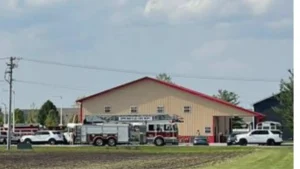The Svalbard Global Seed Vault, also known as the “doomsday” vault, is built deep inside a mountain in Norway’s Arctic region. It consists of man-made caves designed to store and protect food crop seeds from all over the world. This facility ensures the preservation of vital genetic codes in case of a global catastrophe.
The vault is designed to withstand various disasters, whether natural or man-made, including floods, blizzards, volcanic eruptions, climate change, war, and nuclear threats. Launched in 2008, it has since functioned as a crucial genetic bank for thousands of crop and plant species.
Sudan’s Decision to Deposit Crop Seeds
Sudan, a country in northeast Africa bordering Egypt, has decided to send samples of its essential crop seeds to the vault. The reason behind this move is Sudan’s ongoing crisis, which has put its agricultural future at risk.
The Ongoing Crisis in Sudan
Although the world has yet to face an apocalyptic event, wars and conflicts continue to impact different regions, including Sudan. Unlike the highly publicized wars in Ukraine and Gaza, the Sudanese civil war has received less attention, despite its devastating consequences.
The conflict began in April 2023, when the Sudanese Army clashed with the country’s paramilitary faction, the Rapid Support Forces. This war has resulted in the deaths of tens of thousands of people. According to BBC reports, by May 2024, the death toll in Sudan’s civil war had exceeded 150,000—more than the combined casualties in Ukraine and Gaza.
In the capital, Khartoum, alone, over 61,000 people had lost their lives by October 2024. The ongoing war has left hundreds of thousands injured, displaced more than 12 million people, and pushed over half of Sudan’s population—around 50 million—into severe hunger and malnutrition. Many areas of the country are facing famine.
Preserving Hope Through Crop Seeds
It’s not just people suffering due to the conflict; plants and animals have also been affected. To ensure the survival of key agricultural crops, Sudan has chosen to preserve the genetic codes of its local plants. “In Sudan…these seeds represent hope,” said the director of Sudan’s Agricultural Plant Genetic Resources Conservation and Research Centre.
Sudan is depositing seeds from 15 different crop species, including several varieties of sorghum—a crucial crop for the nation’s food security and cultural heritage.
A Global Initiative for Crop Preservation
Sudan is not the only country sending seeds to the Svalbard Vault. Several other nations have also contributed to the initiative. Sweden has deposited seeds of Nordic tree species, while Thailand has sent rice varieties. In total, 14,022 new samples have been added to the vault.
The Role of the Svalbard Vault in Global Food Security
The “doomsday” vault has played a critical role in securing crop diversity across the world. The facility is protected by permafrost, which helps maintain the viability of stored seeds. Between 2015 and 2019, the vault assisted in rebuilding seed collections that were destroyed during the war in Syria.
“The seeds deposited this week represent not just biodiversity, but also the knowledge, culture, and resilience of the communities that steward them,” said Stefan Schmitz, Executive Director of the Crop Trust.
As conflicts, climate change, and other global challenges continue to threaten food security, the Svalbard Global Seed Vault remains a vital safeguard for future generations.























